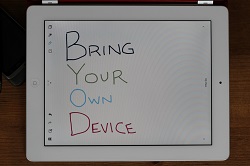Given that huge innovations are being made in edtech each week, it’s exciting to speculate on what devices the average British school will be using in a few years. Dominic Norrish, Group Director for Technology at United Learning, looks at what developments are likely to take place, making three main predictions.

If you are looking for a quick way to destroy your credibility and give people an additional opportunity to sneer at the depth of your ignorance, speculating on how technology may change education is probably the most effective method available to the average blogger.
Still, here goes…
What is innovation, exactly? Teacher of French and Japanese Rory Gallagher discusses how teachers and companies affect education-innovation.

We are already 14 years into the 21st century, and most of us are just catching up with existing technology – like the internet, social media, touchscreens, digital files etc. We are starting to discover the applications of these inventions in our lives, and realising which are the important innovations, which are simply gimmicks, and which are merely improvements on existing systems. But have our values really changed? In this post I will attempt to provoke and challenge our conceptions of innovation, and I hope to raise more questions than I can answer.
Given how important and useful digital devices have become in education, industry expert Chris Wiseman gives specific reasons why BYOD is so paramount.

As published in the September 2013 edition of our magazine.
Schools have and always will be faced with tough decisions when it comes to new technology: Which platform to purchase? What codes and practices to adopt?
Perhaps the most difficult choices come during the early phases of emerging trends, such as Bring Your own Device (BYOD), a mobile learning framework whereby students are allowed to use their own tablets or smartphones for educational purposes on the school network. It is not unusual for digital natives today to own multiple devices for different situations and activities. Smartphones, tablets, notebooks, laptops, and e-readers are all valuable learning tools for schools to tap into. Whilst most schools would like to be able to provide a device for every student, in reality it may be unfeasible, particularly in financially unstable times.

A community-driven platform for showcasing the latest innovations and voices in schools
Pioneer House
North Road
Ellesmere Port
CH65 1AD
United Kingdom